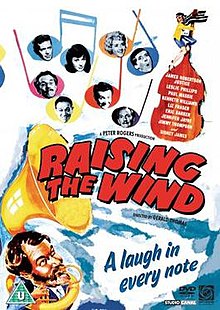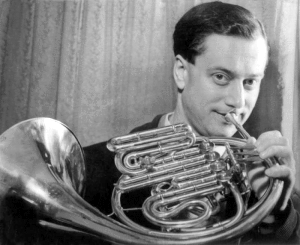
Dennis Brain was a British horn player. From a musical family – his father and grandfather were horn players – he attended the Royal Academy of Music in London. During the Second World War he served in the Royal Air Force, playing in its band and orchestra. After the war he was principal horn of the Philharmonia and Royal Philharmonic orchestras, and played in chamber ensembles.
The Gramophone Classical Music Awards, launched in 1977, are one of the most significant honours bestowed on recordings in the classical record industry. They are often viewed as equivalent to or surpassing the American Grammy award, and referred to as the Oscars for classical music. They are widely regarded as the most influential and prestigious classical music awards in the world. According to Matthew Owen, national sales manager for Harmonia Mundi USA, "ultimately it is the classical award, especially worldwide."
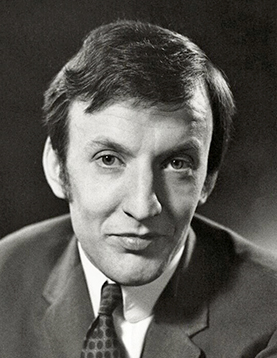
Sir Richard Rodney Bennett was an English composer of film, TV and concert music, and also a jazz pianist and occasional vocalist. He was based in New York City from 1979 until his death there in 2012.
Sinfonia concertante is an orchestral work, normally in several movements, in which one or more solo instruments contrast with the full orchestra. It emerged as a musical form during the Classical period of Western music from the Baroque concerto grosso. Sinfonia concertante encompasses the symphony and the concerto genres, a concerto in that soloists are on prominent display, and a symphony in that the soloists are nonetheless discernibly a part of the total ensemble and not preeminent. Sinfonia concertante is the ancestor of the double and triple concerti of the Romantic period corresponding approximately to the 19th century.
Four Scottish Dances (Op.59) is an orchestral set of light music pieces composed by Malcolm Arnold in 1957 for the BBC Light Music Festival.
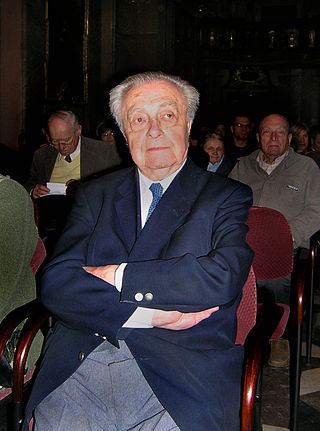
Ilja Hurník was a Czech composer and essayist.

Basil Cameron, CBE was an English conductor.
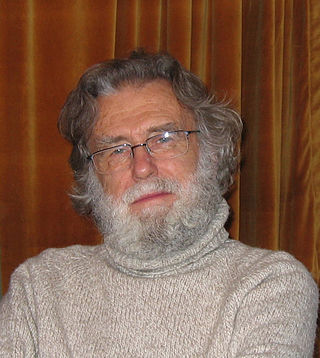
Vladislav Shoot was a Russian-British composer of contemporary classical music. Born in Voznesensk, Soviet Union, now Ukraine, he moved to the United Kingdom in the early 1990s, settling on the artists' estate of Dartington Hall.
Ralph Henry Kirshbaum is an American cellist. During his career he has performed as soloist with major orchestras worldwide, won prizes in several international competitions, and recorded extensively.
Roberto Sierra is a Puerto Rican composer of contemporary classical music.
The Sinfonia Concertante in B flat major, by Joseph Haydn was composed in London between February and March 1792. The work is a sinfonia concertante with four instruments in the solo group: violin, cello, oboe and bassoon. It is believed to be a response to similar works composed by Ignaz Pleyel, a former student of Haydn's who London newspapers were promoting as a 'rival' to Haydn. In addition to the solo group the Sinfonia Concertante is scored for flute, 2 oboes, 2 bassoons, 2 horns, 2 trumpets, timpani and strings.
Leighton Lucas was an English composer and conductor. Born into a musical family, he began his career as a dancer for Sergei Diaghilev's Ballets Russes (1918–21). He became a ballet conductor at 19, and in 1941 became musical director of the Ballet Guild, a wartime company for which he formed first a quintet, later an orchestra. He also worked as an arranger for Jack Hylton's orchestra between c.1926 and 1930.
The Melos Ensemble is a group of musicians who started in 1950 in London to play chamber music in mixed instrumentation of string instruments, wind instruments and others. Benjamin Britten composed the chamber music for his War Requiem for the Melos Ensemble and conducted the group in the first performance in Coventry.
Jean Pougnet was a Mauritian-born concert violinist and orchestra leader, of British nationality, who was highly regarded in both the lighter and more serious classical repertoire during the first half of the twentieth century. He was leader of the London Philharmonic Orchestra from 1942 to 1945.

The trumpet repertoire consists of solo literature and orchestral or, more commonly, band parts written for the trumpet. Tracings its origins to 1500 BC, the trumpet is a musical instrument with the highest register in the brass family.
Matthew Taylor is an English composer and conductor.
This is a summary of 1953 in music in the United Kingdom, including the official charts from that year.
This is a summary of 1955 in music of all genres in the United Kingdom.
Matinées musicales is a 1941 composition by Benjamin Britten using music composed by Gioachino Rossini in and around the 1830s. The suite is a successor to Britten's earlier suite based on Rossini, Soirées musicales (1937).
Graham Whettam was an English post-romantic composer.
